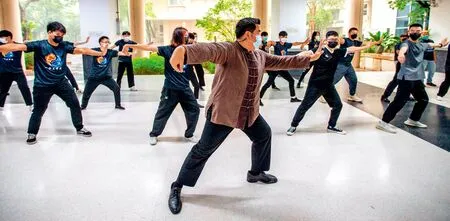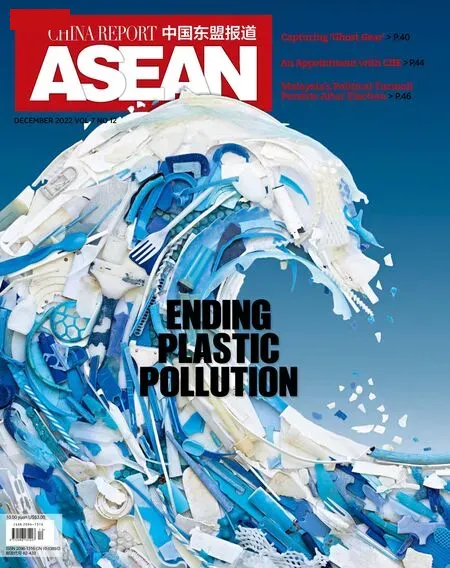SOFT POWER, SOLID FOUNDATION Cultural exchanges take China-Thailand relations to new heights
By Wang Hai
A fter attending the 17th Group of 20 (G20) Summit in Bali, Indonesia, Chinese President Xi Jinping arrived in Bangkok on November 17 to attend the 29th APEC Economic Leaders’ Meeting and make a state visit to Thailand.
The last time Xi made a state visit to Thailand was 11 years ago in December 2011 as Vice President of China, so this was his first visit as a head of state. When meeting with King Maha Vajiralongkorn, President Xi noted that this year marks the 10th anniversary of the establishment of China-Thailand Comprehensive Strategic Partnership and asserted that China stands ready to promote bilateral friendship, reaffirming that “China and Thailand are as close as one family.” He expressed hope to build a China-Thailand community with a shared future and lift China-Thailand relations to new heights.
Good Neighbors, Friends, and Partners
Although China and Thailand did not restore diplomatic relations until 1975, the close neighbors enjoy a long history of friendship. Since the establishment of diplomatic relations, the China-Thailand relationship has witnessed nearly five decades of development and the bilateral cooperation has been gaining progress in multiple fields including economics and trade, cultural exchanges, infrastructure, and military.
On economic and trade cooperation, China is now Thailand’s largest trading partner. Bilateral trade value exceeded US$88 billion in 2018, of which over US$43 billion came from China’s exports to Thailand. Meanwhile, both countries gained impressive results in cooperation on the China-Laos Railway, implementation of free trade agreements, Lancang-Mekong Cooperation, and infrastructure development, which have enhanced the strategic complementarity between the China-proposed Belt and Road Initiative and Thailand’s initiative of Eastern Economic Corridor.
On tourism, China already overtook Malaysia to become Thailand’s largest source of tourists a decade ago. Although global tourism has been pummeled by the COVID-19 pandemic, the industry remains a critical sector of Thailand’s economy. Attaching great importance to it, the Thai government has leveraged the popularity of Chinese movies such as Lost in Thailand and China’s Double 11 online shopping festival to tailor tourism service programs targeting Chinese tourists.
On education exchange, Thailand is a major focus of China’s cultural exchanges with Southeast Asian countries. China has established 31 Confucius Institutes in the ASEAN region, 16 of them in Thailand. Chinese and Thai cultural and language education organizations’ cooperation projects are led by leading colleges including Peking University and Chulalongkorn University. In 2007, China established China Cultural Center Bangkok, the first of its kind in Southeast Asia.
Dr. Kornphanat Tungkeunkunt, a professor in the Faculty of Liberal Arts at Thammasat University, opined that the democratic and diverse cultural context formed after the 1990s in

The Thai dean of the Maritime Silk Road Confucius Institute teaches Chinese tai chi during a class at Dhurakij Pundit University in Bangkok on April 21, 2022. (WANG TENG)
Thailand provided the social and cultural nutrients for the growth of transnational cultural institutions and multi-level educational exchange between China and Thailand.
Changes and Challenges
Despite a golden decade of rapid development, China-Thailand relations are still affected by challenges brought by global issues like the protracted trade war between China and the United States, the COVID-19 pandemic, and the Russia-Ukraine conflict.
Competition between China and the U.S. has long been the core factor affecting the diplomatic landscape in Southeast Asia, so the diplomatic policies of countries in the region cannot escape it, according to David Shambaugh, Professor of Political Science and International Affairs at George Washington University. The relationship between China and Thailand still faces considerable uncertainty because it depends not only on both sides’ attitudes towards bilateral cooperation, but also on American policies and strategies in Southeast Asia and even the competition of other major countries and organizations such as Japan, the European Union, and Australia.
Historically, Thailand’s relations with China were profoundly influenced by the international political landscape and major-country competition. In the early stage of the People’s Republic of China, anticommunism sentiment in Southeast Asia made Thailand break off relations with China and even shut down Chinese schools and banned the publishing of Chinese books and magazines.
Changes in the political landscape in Southeast Asia in the 1970s and the establishment of China-U.S. diplomatic relations in 1979 paved the way for Thailand to gradually restore its communication with China. The bilateral relations have enjoyed steady development ever since the two countries established diplomatic relations in 1975. Entering the 21st Century, the China-Thailand relations have been witnessing rapid development fueled by economic cooperation.
Despite the solid foundation for rapid development of China-Thailand relations, the ball is in Thailand’s court, politically speaking, and even throughout ASEAN, on whether China and Thailand can work together to build a more stable, prosperous, and sustainable China-Thailand community with a shared future.
Cultural soft power will likely be of greater importance in the post-pandemic era.
Closer Cultural Connection
If the economy has been the bridge or catalyst for growth of China-Thailand relations in the past decade or longer, then in the next decade, cultural diplomacy and cultural connections could serve as the new booster for development of the bilateral relations.
The COVID-19 pandemic has greatly weakened Thailand’s tourism. The industry contributed 11 percent of Thailand’s GDP in 2019, but after the outbreak of the pandemic, the country’s GDP in 2020 dropped by 6 percent. Although Thailand has eased its pandemic-control restrictions for international tourists, it remains unclear when China, its largest source country of tourists, will open its outbound travel market. While construction of many international projects and infrastructures is gradually resuming, scholars hold different opinions on whether the China-Thailand economic cooperation will continue to constitute the direct driving force of bilateral relations.
Dr. Kornphanat Tungkeunkunt identified the cultural connection as highly significant to China’s soft power in Southeast Asia. When meeting Thai Prime Minister Prayut Chan-o-cha, President Xi stressed that the core to “developing China-Thailand relations in the new era” is “bringing more benefits to the peoples of both countries.” China and Thailand wield great potential for cooperation in many aspects including education, exchange of talent, media, high-level seminars, research and development, and the cultural industry.
Cultural soft power will likely be of greater importance in the postpandemic era. Compared to other sectors, cultural and people-to-people exchanges fit better with the post-COVID situation because they can be conducted more flexibly. For example, both countries could organize cultural seminars online and offline, coproduce films or TV programs, or hold online classes. Such cooperation overcomes the restrictions of space and time, and can further boost bilateral exchange and relations.
As cultural exchange becomes a more important subject in the development of bilateral relations, China and Thailand should focus on leveraging cultural communication to make it a solid foundation for a more stable, prosperous, and sustainable China-Thailand community with a shared future.
- China Report Asean的其它文章
- Capturing ‘Ghost Gear’Discarded fishing gear continues to “fish” as the ocean’s silent killer
- Logistics Turning ‘Green’
- NEWS in Brief
- Picturing the Times
- CHINA AND INDONESIA JOIN HANDS TO BOOST DEVELOPMENT Solidarity is key to tackling global challenges
- OPPORTUNITIES AND CHALLENGES FOR ASEAN’S NEW ENERGY DEVELOPMENT New energy cooperation between China and ASEAN has shifted from pure investment and trade to capacity-building cooperation, with the scope and depth expanding constantly

